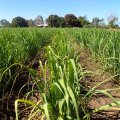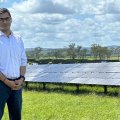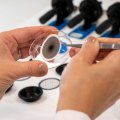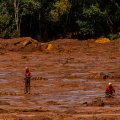Groundbreaking research to develop new guidelines to assess air quality in mining regions is underway between The University and Queensland and INCT-ACQUA, a research institute supported by three leading institutions in Brazil.
The collaboration between UQ and the Universidade Federal de Minas Gerais (UFMG), the Brazilian National Council for Scientific and Technological Development (CNPq) and the Foundation for Research Support of the State of Minas Gerais (FAPEMIG) will take a holistic approach to generate data to provide comprehensive environmental and human health risk assessments in mining areas.
Project leader Associate Professor Massimo Gasparon from UQ’s School of Earth Sciences said that the project would simultaneously assess water, soil, and air quality in the areas under investigation.
“In the recent past, environmental investigations in mining areas have focused on water and soil quality, and guidelines for environmental and human health risk assessment have been developed for these areas," said Professor Gasparon.
“It is becoming increasingly obvious that air quality can also be severely impacted by large-scale mining activities, and there is significant uncertainty over what should be monitored, what guidelines should be applied and how to actually assess exposure.
“The data generated from this project will be integrated with existing soil and water quality guidelines to produce a comprehensive environmental and human health risk assessment.
“Mining companies around the world will benefit from this research as it will provide the tools and methodology for assessing the effectiveness of their existing environmental management programs, particularly with regards to their water management and dust emission monitoring and control.
“This will allow them to develop and implement strategies that will ultimately lead to a reduction in their environmental management costs, and a better and healthier environment for their own workforce and for the general public,” he said.
The project has been funded by the Brazilian Government’s Science Without Borders Program as part of a Special Visiting Researchers Scholarship awarded to Associate Professor Gasparon for his comprehensive research collaborations in the State of Minas Gerais.
The funding will also help develop a broader collaboration to establish a hub for research into water, soil and air quality in partnership between UQ and institutions in the State of Minas Gerais.
The University of Queensland has a strong bilateral relationship with Brazil, with nine formal research and academic agreements with eight institutions in the country.
As part of the University’s commitment to the UQ-Brazil relationship, UQ Vice-Chancellor, Professor Peter Høj will visit Brazil in May to meet key partners, including UFMG and FAPEMIG, to broaden and deepen collaborations in a range of priority areas.
Media: Liz Rourke, UQ International, 07 3346 0665 or e.rourke@uq.edu.au
BACKGROUND
The University of Queensland is in the top 100 universities worldwide, measured through a number of major independent university rankings: the Academic Ranking of World Universities, Times Higher Education World University Rankings, QS World University Rankings, and Performance Ranking of Scientific Papers for World Universities.
UQ also has more specialised fields of research “well above world standard” than any other Australian university, according to the 2012 Excellence in Research for Australia (ERA) assessment.






_1 620W.jpg?itok=y7rQ1CJX)






